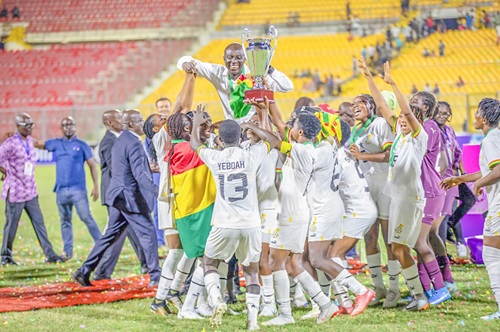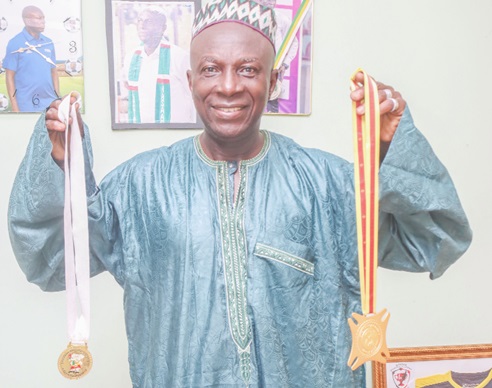
Yussif Basigi: Records in women’s football equally important
When on the night of March 21, 2024, at the Cape Coast Stadium, the final whistle went for the end of the game, Coach Yussif Basigi was a satisfied man because he had just led Ghana to claim the gold medal in women’s football.
Advertisement
For him, it was a mission accomplished as he had ahead of the 13th African Games staged in Accra, set a target of winning gold on home soil. Unknown to him, however, beyond winning the prized gold medal, adding to Ghana’s medal haul, Basigi, just like an athlete, also set a record in the African Games: He became the first coach, for either male or female football, to win two gold medals in football in as many games.
Apart from winning 2-1 against Nigeria on that night at the Cape Coast Stadium, Basigi in 2015, also led Ghana’s Black Queens to win the gold medal at the 11th African Games staged in Congo Brazzaville as the games celebrated its 50th anniversary. That game was won 1-0 against Cameroun.
“I know Nigeria have won the gold medal in women’s football three times since it became a competitive game in the Games in 2003, and I thought two of those were with the same coach.

Moment of pride : Coach Basigi leads his team for the medal decoration moments after claiming the 2023 African Games gold medal against Nigeria at the Cape Coast Stadium
It was when you drew my attention to the fact that I could be the first person to win two gold medals in football after we had qualified for the final of the Accra 2023 Games that I realised the rare feat that I could achieve if Ghana won,” Coach Basigi said in an interview with this reporter.
Since women’s football was admitted as a competitive sport in 2003, Nigeria have won it three times – 2003, 2007 and 2019 but all under different coaches. Basigi thus becomes the first coach to win with two different teams – the Black Queens and the Princesses.
The latest feat adds up to the already impressive list of records or first achievements Coach Basigi has chalked up for both club and country since becoming a coach in 2003, something every coach would readily talk about.
“At the height of the work of any coach is success at the end of it all. For me, I have dedicated my time and efforts to helping women’s football develop and progress and we need to chart the path for future generations.
“People still talk of the late C.K Gyamfi, Coach Sam Arday and E.K Afranie and what they did for football. There is the need for the same to be done for women’s football and that is what drives my passion to win anytime I have the chance to,” Basigi, often referred to as women’s football professor, said.
Records
In Africa and on the local scene, Basigi is one of the longest-serving coaches in women’s football, having started as the coach of Hasaacas Ladies, a side he still handles, leading them to chalk up all the successes they have recorded.

Football is all about team work. The team who has helped Coach Basigi to succeed. From left : Raymond Fenny (Goalkeepers coach), Anita Wiredu Mintah (Assistant coach), Coach Basigi and Joe Nana Adarkwah (Assistant Coach)
He led the club to its first women’s premier league title in 2013 and went on to win the 2014 and 2015 editions, becoming the first to achieve that feat. Also, he was the man in charge when they won the quadruple in 2021 – winning the WPL, the FA Cup, the WAFU and the maiden edition of the First Lady’s Cup.
That same year, he led the team to win the maiden edition of the West African Football Union (WAFU) Zone B Champions League, the qualifying competition for the inaugural CAF Champions League.
That victory qualified Hasaacas Ladies to the main tournament in Cairo, Egypt where they became the first team from Ghana to reach the final, losing that game to South Africa’s Mamelodi Sundowns.
At the national level, he has handled the Queens and Princesses and chalked up some successes as well, with the African Games gold medal wins highlighting those feats.
New target
In September, he will have another opportunity to add up to the record, if he can lead the Princesses to the Under-20 Women’s World Cup (WWC) in Colombia, on their seventh successive attempt.

Counting his blessings : Coach Basigi as part of his thanksgiving to Allah, went for the Eid ul Fitr prayers with his two African Games gold medals won in 2015(right) and 2023
This will be Basigi’s second appearance at the U-20 WWC, having led the team to the 2018 edition in France, and while he could not lead them to go past the group stage, as they had to contend with hosts, France, eventual runners-up, The Netherlands and New Zealand, he showed so much promise that after the competition, he earned an offer to train in Germany.
Ghana are among the four African countries to compete at this year’s event and with Nigeria, the only successful side from Africa, Basigi hopes he can replicate whatever he has done at the local and sub-regional level at the world stage as well.
Records matter
He said the records being made in women’s football now were as important as the ones made in men’s football, adding that it was those records made then that “have given history, pedigree and class to the clubs many people admire now”.
He believed that the records being made now would only serve as motivation for the future “because women’s football in Ghana, Africa and the world will be a dominant sport”. “The future looks very bright for women’s football and it’s a matter of time for it to become like men’s football,” he stated.
Profile
Born on March 1, 1972. Basigi has a diploma in Education and also holds a Bachelor’s degree in Health, Physical Training and Recreation from the University of Education, Winneba.
A teacher by profession, he is presently the PE Coordinator of the Shama Municipality of the Ghana Education Service (GES).
Born and raised in Tamale in the Northern Region, he attended Damongo Senior High School, Tamale Senior High School and earned his professional teaching credentials from the Bagabaga Training College.
Basigi’s love for football developed at an early age, which saw him play for his school team and went on to have a short playing stint in Ghana and Burkina Faso. Keen to pursue his dream of developing talent and helping players to be better, he gave up playing and with his background as a PE teacher, diverted to coaching.
He is a Muslim and also a family man, who is married with three children, but given the pressure the job brings, he has chosen to keep his family out of public eyes.




